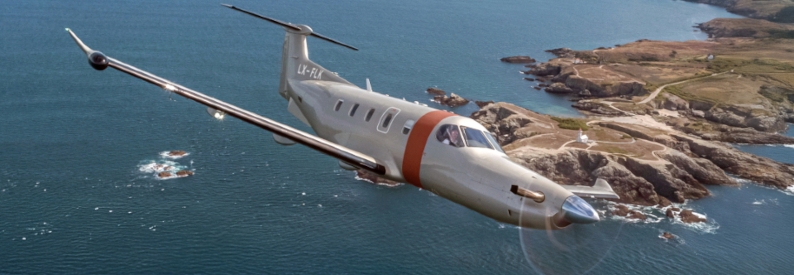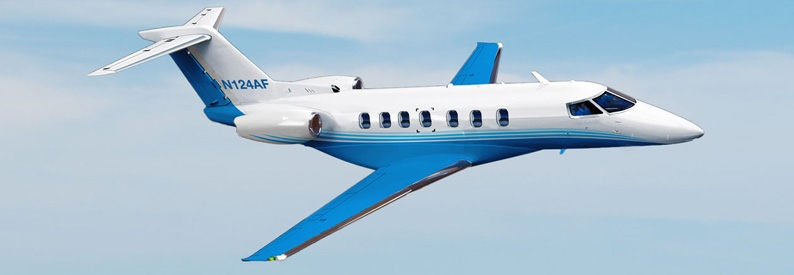Fractional ownership specialist PlaneSense (Portsmouth) aims to grow its fleet of Pilatus Aircraft to exceed 100 units, around 50% more than it currently has, president and CEO George Antoniadis told ch-aviation in an exclusive interview at the sidelines of the NBAA-BACE convention in Las Vegas.
"Our fleet is approximately 60 aircraft, and we can definitely grow to exceed 100. We definitely need to grow the PC-24 fleet more because we want to accomplish economies of scale," he said.
The company currently operates a mixed fleet of PC-12-47Es and PC-24s. It originally launched with the turboprop variant and started adding the light jets more recently. Antoniadis explained that because of this, its fleet was still skewed towards the more mature PC-12 platform. As of October 1, PlaneSense had forty-four PC-12s and fourteen PC-24s on its Part 135 certificate under the Cobalt Air (United States of America) brand.
Antoniadis said that the choice of the Pilatus types was driven by their cost-effectiveness and performance capabilities. The operator tries to rotate the aircraft in its fleet to keep the average at around four years, which means that it has the most modern technology in the turboprop and light jet categories.
The expansion into the PC-24 segment allowed PlaneSense to respond to the requests of its customers, who were already fractional owners of PC-12s but wanted to add a jet aircraft.
"We feel very comfortable with this sort of natural evolution. It's in keeping with our philosophy of very cost-effective transportation, and we have taught ourselves to function and deliver at that price level. We are very, very disciplined with our overhead costs and how we intelligently build our company so that we can deliver a value proposition," Antoniadis said.
While he admitted PlaneSense was getting requests from its customers for larger jets, it has not yet made any decisions about expanding beyond the PC-24 size category. This would require selecting another OEM, as the Swiss manufacturer does not build any larger jets.
"We have evaluated many aircraft types, but we're not ready to give a timeline. In this project, we have a lot more growth with our current aircraft," Antoniadis said.
Charter business and ownership approach
Despite having a Part 135 charter certificate under the Cobalt Air name, PlaneSense does not see itself as a charter specialist and is not actively pursuing opportunities in this segment. While all of its aircraft are on the Part 135 certificate (alongside the core Part 91 subpart K fractional certificate), this is secondary to the fractional business. Nonetheless, it would offer charters to decrease the risk of asset ownership and opportunistically for demonstration flights, donation flights, and other commercial operations. The charter business was also an important source of revenue during the Covid-19 pandemic.
Antoniadis said that the fractional ownership model was gaining in popularity due to the shifting trends in aircraft ownership. In the past, business aircraft owners tended to build a fleet with one aircraft in each of the categories suitable for various missions - for example, they would have a small jet for short flights and a long-range one. Now, however, they are increasingly turning to shares of aircraft in each of these categories as their usage does not require full ownership.
"It's very good for the customers because they can fully optimise the quality of their fleet," Antoniadis said.
Geographical outlook
PlaneSense started its business in the northeast US, operating out of its base at Portsmouth International Airport, NH. However, given that the bulk of its flying is for fractional owners, the aircraft are not limited to any specific geography or routes.
"We started historically from the northeast. We then covered all of the east. We are covering the centre of the country, and as of June, we cover all the way to the Pacific. We landed at 1,172 airports," Antoniadis outlined.
He stressed that the short-runway capabilities of both types allow PlaneSense to offer services from a wider range of airports compared to its competitors.
Maintenance and supply-chain woes
PlaneSense has two in-house maintenance facilities, one at Portsmouth and the other at Boulder City, NV. This makes it the world's largest maintenance services provider for Pilatus aircraft. However, the company focuses on maintaining its own fleet and does not pursue third-party contracts.
Antoniadis said the in-house maintenance capabilities allow PlaneSense to deal with the prevalent supply chain issues. The limiting factor is the parts' availability and quality, and this does not depend on whether the company has its own Part 145 certificate or not.
"There are not enough spare parts, and those spare parts take forever to deliver. We have disruptions to our delivery schedule because the suppliers to the factory are also delayed," Antoniadis said.


